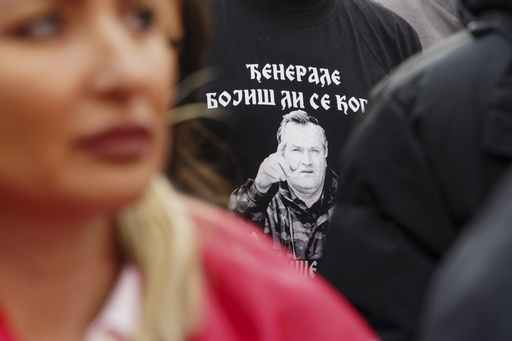In the city of Banja Luka, Bosnia-Herzegovina, supporters of Milorad Dodik, the separatist President of the Bosnian Serbs, gathered for a rally amidst escalating tensions. This comes just before a crucial court decision set for Wednesday, which could see Dodik banned from politics or even imprisoned. The case, lasting a year, revolves around charges that Dodik defied the top international envoy responsible for maintaining peace in the Balkans.
If found guilty, Dodik faces a possible prison sentence of up to five years and could be barred from political activity for a decade. Dodik, showing defiance, stated that he would not comply with any conviction, suggesting he might adopt radical measures in retaliation, including the secession of Republika Srpska—the Serb-governed entity—from Bosnia.
The Bosnian civil war saw Bosniaks, Serbs, and Croats embroiled in conflict, culminating in a 1995 peace deal orchestrated by the U.S. that divided the nation into two autonomous regions: Republika Srpska and the Bosniak-Croat Federation. Despite their autonomy, certain national institutions remain unified, such as the army, the judiciary, and the tax system. Moreover, Bosnia is overseen by a tripartite presidency composed of Bosniak, Serb, and Croat representatives.
Dodik announced that he would not attend Friday’s court session and is unlikely to serve prison time due to staunch backing from Serbia’s President, Aleksandar Vucic, who could offer refuge in Belgrade. Dodik also plans to appeal if convicted. Over the years, he has advocated for the partition of Bosnian Serbs, which led to sanctions from the U.S. and the U.K. due to allegations of corruption and pro-Russian stances.
The separatist rhetoric from Dodik elicited alarm in Bosnia, a nation still haunted by a war that claimed 100,000 lives and displaced millions between 1992 and 1995, brought to an end by the Dayton Accords. Historically, Dodik has leaned on Russian backing for his separatist agenda and is a known admirer of former U.S. President Donald Trump. Among the rally attendees was Rudy Giuliani, the former mayor of New York City.
Thousands of Dodik’s supporters gathered in Banja Luka, brandishing flags emblazoned with his image. Addressing the crowd, Dodik insisted the legal proceedings were a targeted move against Bosnian Serbs. “They could not put you all in prison, so they chose me instead,” he declared to the assembled masses.
Earlier in the day, Christian Schmidt, the High Representative overseeing the implementation of the Dayton Accords in Bosnia, reassured the public of Bosnia’s stability. “Be assured, the international community remains vigilant,” Schmidt stated. “The international community remains firmly committed to peace and stability in this region. (The unity of) Bosnia and Herzegovina is not negotiable.”
Dodik has repeatedly challenged Schmidt’s authority, condemning his decisions as illegal in Republika Srpska. Under the Dayton framework, the high representative retains the power to enforce decisions and amend laws in Bosnia. The conflict in Bosnia, ignited by Serbs’ opposition to independence from Yugoslavia, sought to forge a mini-state aimed at unification with Serbia.
Like many nations in the volatile Balkans, Bosnia aims for European Union membership, yet progress remains sluggish.


